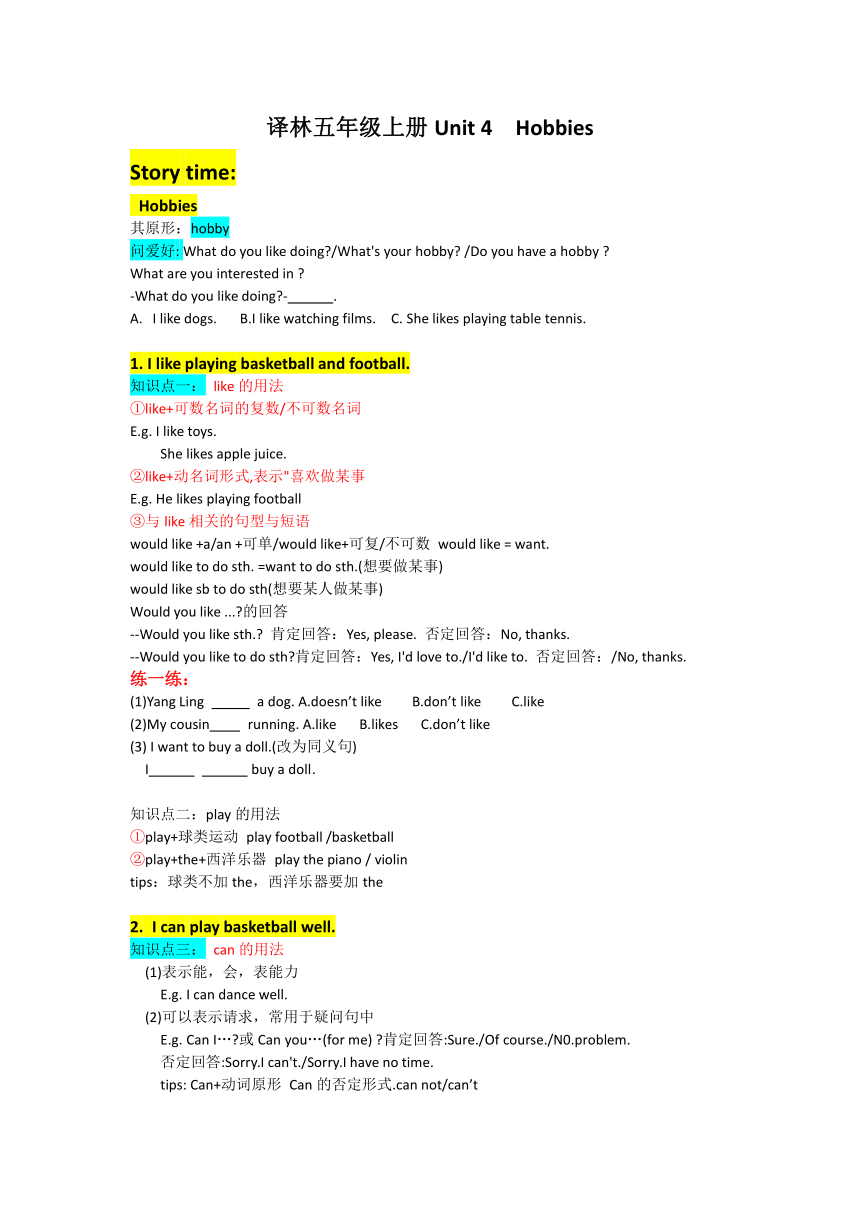Unit 4 Hobbies Story time讲义
文档属性
| 名称 | Unit 4 Hobbies Story time讲义 |

|
|
| 格式 | docx | ||
| 文件大小 | 20.8KB | ||
| 资源类型 | 教案 | ||
| 版本资源 | 牛津译林版 | ||
| 科目 | 英语 | ||
| 更新时间 | 2023-10-27 16:45:33 | ||
图片预览

文档简介
译林五年级上册Unit 4 Hobbies
Story time:
Hobbies
其原形:hobby
问爱好: What do you like doing /What's your hobby /Do you have a hobby
What are you interested in
-What do you like doing - .
I like dogs. B.I like watching films. C. She likes playing table tennis.
1. I like playing basketball and football.
知识点一: like的用法
①like+可数名词的复数/不可数名词
E.g. I like toys.
She likes apple juice.
②like+动名词形式,表示"喜欢做某事
E.g. He likes playing football
③与like相关的句型与短语
would like +a/an +可单/would like+可复/不可数 would like = want.
would like to do sth. =want to do sth.(想要做某事)
would like sb to do sth(想要某人做某事)
Would you like ... 的回答
--Would you like sth. 肯定回答:Yes, please. 否定回答:No, thanks.
--Would you like to do sth 肯定回答:Yes, I'd love to./I'd like to. 否定回答:/No, thanks.
练一练:
(1)Yang Ling a dog. A.doesn’t like B.don’t like C.like
(2)My cousin running. A.like B.likes C.don’t like
(3) I want to buy a doll.(改为同义句)
I buy a doll .
知识点二:play的用法
①play+球类运动 play football /basketball
②play+the+西洋乐器 play the piano / violin
tips:球类不加the,西洋乐器要加the
I can play basketball well.
知识点三: can的用法
(1)表示能,会,表能力
E.g. I can dance well.
(2)可以表示请求,常用于疑问句中
E.g. Can I… 或Can you…(for me) 肯定回答:Sure./Of course./N0.problem.
否定回答:Sorry.I can't./Sorry.I have no time.
tips: Can+动词原形 Can的否定形式.can not/can’t
can没有人称和数的变化但有时态的变化。can的过去式:could
can的基本句型
1.肯定句:主+can+动词原形+其他 e.g. They can write well.
2.否定句:主+cannot/can’t+V原+其他 e.g. She/ They can't dance well.
3.疑问句:can+主+V原十其他 e.g. Can they write well
4.特殊疑问句: 特殊疑问词+can+主+V原+其他
肯定回答:Yes,主+can. 否定回答:N0,主+can’t.
E.g. Who can write well
练一练:
He can swim .(good)
Helen does well in English and she speaks English very .
Can you (sing)
知识点四: well
作为形容词表示”身体好”
E.g. How are you I'm well .
作为副词adv.修饰动词
E.g. I can dance well.
She can skate well.
I am not good at football.
知识点五: 擅长做某事
be good at doing sth/be good at sth
E.g. He is good at playing basketball./He is good at basketball.
试一试:
I (be)good at (sing).
Tom is good at (skate).
Lucy (be not) good at (dance).
4. I like drawing too.
知识点六: also/too的用法
also用于句中.放在be动词/情态动词或助动词之后
too.用于肯定句或疑问句,一般不用于否定句,且通常放在句末并用逗号与前文分开。either.通常用于否定句,且要放在句末。
E.g. I am a doctor, She is a doctor,too.
I am not a doctor. She is not a doctor, either.(否定句)
He can also play badminton.
I usually draw in the park with my brother Tim.
知识点七: 频率副词:always-usually -often - sometimes -seldom-hardly -never,
对频率副词提问用"how often"表示"多久一次"
E.g. He seldom goes home.
How often does he go home
知识点八: and/with用法
and表示并列.译"而且"."和"、"又",前后对等
E.g. Miss Li and Mr Green are English teachers.
with介词,表随从,前后不对等、译为"和...一起"."跟"具有"等
E.g. Linda has a picnic with her friends(表伴随)
They both like swimming
知识点九: both/all的用法
"both":两者,都.仅指两个人或物
常见的搭配:both...and....
E.g. There are many trees on both sides of the road.
"all":全部,都,指三个或三个以上的.
E.g. I like all of the subjects. They are useful for me.
注意: all的否定形式none;both的否定形式:neither
试一试:
Yang Ling and I like playing the piano.
both B.too C.all
We (都) have an English lesson.
Story time:
Hobbies
其原形:hobby
问爱好: What do you like doing /What's your hobby /Do you have a hobby
What are you interested in
-What do you like doing - .
I like dogs. B.I like watching films. C. She likes playing table tennis.
1. I like playing basketball and football.
知识点一: like的用法
①like+可数名词的复数/不可数名词
E.g. I like toys.
She likes apple juice.
②like+动名词形式,表示"喜欢做某事
E.g. He likes playing football
③与like相关的句型与短语
would like +a/an +可单/would like+可复/不可数 would like = want.
would like to do sth. =want to do sth.(想要做某事)
would like sb to do sth(想要某人做某事)
Would you like ... 的回答
--Would you like sth. 肯定回答:Yes, please. 否定回答:No, thanks.
--Would you like to do sth 肯定回答:Yes, I'd love to./I'd like to. 否定回答:/No, thanks.
练一练:
(1)Yang Ling a dog. A.doesn’t like B.don’t like C.like
(2)My cousin running. A.like B.likes C.don’t like
(3) I want to buy a doll.(改为同义句)
I buy a doll .
知识点二:play的用法
①play+球类运动 play football /basketball
②play+the+西洋乐器 play the piano / violin
tips:球类不加the,西洋乐器要加the
I can play basketball well.
知识点三: can的用法
(1)表示能,会,表能力
E.g. I can dance well.
(2)可以表示请求,常用于疑问句中
E.g. Can I… 或Can you…(for me) 肯定回答:Sure./Of course./N0.problem.
否定回答:Sorry.I can't./Sorry.I have no time.
tips: Can+动词原形 Can的否定形式.can not/can’t
can没有人称和数的变化但有时态的变化。can的过去式:could
can的基本句型
1.肯定句:主+can+动词原形+其他 e.g. They can write well.
2.否定句:主+cannot/can’t+V原+其他 e.g. She/ They can't dance well.
3.疑问句:can+主+V原十其他 e.g. Can they write well
4.特殊疑问句: 特殊疑问词+can+主+V原+其他
肯定回答:Yes,主+can. 否定回答:N0,主+can’t.
E.g. Who can write well
练一练:
He can swim .(good)
Helen does well in English and she speaks English very .
Can you (sing)
知识点四: well
作为形容词表示”身体好”
E.g. How are you I'm well .
作为副词adv.修饰动词
E.g. I can dance well.
She can skate well.
I am not good at football.
知识点五: 擅长做某事
be good at doing sth/be good at sth
E.g. He is good at playing basketball./He is good at basketball.
试一试:
I (be)good at (sing).
Tom is good at (skate).
Lucy (be not) good at (dance).
4. I like drawing too.
知识点六: also/too的用法
also用于句中.放在be动词/情态动词或助动词之后
too.用于肯定句或疑问句,一般不用于否定句,且通常放在句末并用逗号与前文分开。either.通常用于否定句,且要放在句末。
E.g. I am a doctor, She is a doctor,too.
I am not a doctor. She is not a doctor, either.(否定句)
He can also play badminton.
I usually draw in the park with my brother Tim.
知识点七: 频率副词:always-usually -often - sometimes -seldom-hardly -never,
对频率副词提问用"how often"表示"多久一次"
E.g. He seldom goes home.
How often does he go home
知识点八: and/with用法
and表示并列.译"而且"."和"、"又",前后对等
E.g. Miss Li and Mr Green are English teachers.
with介词,表随从,前后不对等、译为"和...一起"."跟"具有"等
E.g. Linda has a picnic with her friends(表伴随)
They both like swimming
知识点九: both/all的用法
"both":两者,都.仅指两个人或物
常见的搭配:both...and....
E.g. There are many trees on both sides of the road.
"all":全部,都,指三个或三个以上的.
E.g. I like all of the subjects. They are useful for me.
注意: all的否定形式none;both的否定形式:neither
试一试:
Yang Ling and I like playing the piano.
both B.too C.all
We (都) have an English lesson.
